- Home
- Jennifer Donnelly
Stepsister Page 12
Stepsister Read online
Page 12
The children were laughing gleefully. Isabelle reached behind over her shoulder and touched the back of her dress. Her palm came away covered in yellow slime.
“Which one of you threw the egg?” she demanded.
No one answered her, but Henri sauntered up to the basket, picked up another egg and, before Isabelle could stop him, launched it straight at her head. His aim was excellent. It hit her right between the eyes.
Isabelle gasped. “Why, you … you little troll!” she shouted as egg ran down her face.
That was all the others needed to hear. They converged on the basket, grabbed eggs, and pelted her with them as hard as they could.
Isabelle should have run straight out of the courtyard and back to her cart. But Isabelle was not one to turn tail. She lunged for the basket, grabbed an egg, and threw it at Henri. Her aim was not as good as his, for she was still blinking egg out of her eyes. The egg went wide and hit little Sébastien instead, right in the back of his head. He tripped, fell down in the grass, and started to howl.
Isabelle threw another egg and pegged Henri in the shoulder. As she grabbed a third from the basket, three more hit her—one in the face. She lobbed the one she was holding just to get rid of it, so she could wipe her eyes again. Though she couldn’t see where it landed, she heard it hit with a loud, wet splat.
“Great God in Heaven, what is going on here?” a voice shrilled.
Isabelle blinked; she opened her eyes all the way and discovered that it was not a child that her egg had hit, but an old woman who was dressed all in white and wearing a rosary around her neck.
Isabelle watched in horror as eggshell slid down the front of her spotless habit, then fell to the ground. Globs of yolk dripped onto the toes of her shoes. The old woman looked at the mess on her clothing. She looked at the children around her, at Henri, rubbing his shoulder, at Émilie, staring at her stained pinafore and sobbing piteously, at little Sébastien, sitting up in the grass now, wailing, “Isabelle, the ugly stepsister … she a-a-attacked us!”
Then the old woman looked at Isabelle. Her eyes, set deep in her wrinkled face, blazed. Her nostrils flared.
“Oh, dear,” Isabelle whispered, pressing her hands to her cheeks. “Oh no.”
It was Sister Claire, the head of the convent, the ancient and venerable mother superior, and she was furious.
The iron gate slammed shut behind Isabelle with a loud, ringing clang.
Shamefaced, she looked back through the iron bars. “I’m so sorry,” she said miserably.
“Never, ever let me see you anywhere near this orphanage again!” Sister Bernadette shrilled, wagging a finger at Isabelle from the other side of the gate. “The mother superior’s fifty-year vow of silence broken … fifty years! All because of you!”
The nun turned on her heel and stalked off, leaving Isabelle by herself. Still cringing, she hobbled to her cart and climbed up to the seat. Martin looked back at her over his shoulder.
“Don’t even ask,” Isabelle said to him.
She wanted to get home desperately, but she was so overcome with regret for what she’d done that she leaned over, put her head in her hands, and groaned. Her mind replayed every dreadful second of what had happened after she’d hit the mother superior in the chest with an egg.
“You should be ashamed of yourself!” the old woman had shrieked. “Throwing eggs at children! Making poor orphans cry! Wasting desperately needed food while a war rages! Never, in all my days, have I witnessed such egregious behavior. I didn’t want to believe what I’d heard—I closed my ears to the gossip—but you, Isabelle de la Paumé, are every bit as awful as everyone says you are!”
As she had been shouting at Isabelle, two nuns that had followed her into the courtyard had been frantically gesturing at her. One had held a trembling finger to her lips. The other had shook her head, saucer-eyed. “Sister, your vow!” she’d said.
To show her piety and devotion, Sister Claire had made a solemn oath of silence five decades ago. Through superhuman effort, she had kept the vow, never uttering a word, communicating with the other nuns through writing only. When she’d realized what she’d done, the old woman had clapped a hand over her mouth and fainted on the spot.
“I—I think she’s dead!” Sister Bernadette had cried.
The minute they heard that, the children—every single one of them—had started wailing in earnest. Alarmed by their noise, a dozen nuns had come running. One had had the presence of mind to sit Sister Claire up and chafe her wrists. A moment later, the old woman had come to. That’s when Sister Bernadette had ushered Isabelle out.
“Oh, Martin,” Isabelle said, now sitting up. “I threw eggs at children. Ten-year-olds. Eight-year-olds. I think one was five.”
She thrust her hand into her skirt pocket, feeling for the bone, the nutshell, and the seedpod. They were still there but felt more like curses now than gifts. Throwing eggs at orphans was no way to earn the fairy queen’s help. She fervently hoped that Tanaquill would not find out about it.
Isabelle made her way home as quickly as she could. Luckily, she met no one else on the road. As soon as she pulled up to the stables, she untacked Martin, brushed him, and left him loose outside to graze. Then she held her head under the pump at the water trough to rinse the egg off.
A few minutes later, she strode into the kitchen, her hair sopping wet, her face red from the cold water, her clothing a filthy mess.
Tavi was stirring a bubbling pot of plum jam. Her eyebrows shot up when she saw her sister. “Looks like charitable pursuits aren’t all they’re cracked up to be,” she said.
Isabelle held up a hand. “Don’t.”
“Where’s our basket? Did someone poach it?”
“Just …”
“Now I’ll have to scramble to find another one.”
“… stop!” Isabelle yelled, covering her ears. She hurried out of the kitchen and went upstairs to change her clothing.
It was a relief to step out of her dress, which was as stiff as meringue. She poured water from the pitcher on her bureau into a basin, wet a cloth, and removed the last traces of egg from her neck. A few minutes later, she was standing in the hallway, doing up the top buttons on a clean dress. As she walked toward the stairs, a voice from behind her said, “Where have you been, Isabelle?”
Isabelle’s heart sank. Not now, Maman, she thought. She still had Martin to deal with and the day’s long list of chores. She did not have time to persuade her mother that there was no ball, dinner, or garden party to ready themselves for.
Tavi had just come up the stairs carrying a tray with a cup of tea on it for their mother. “She went walking,” she said, taking Maman by the arm and leading her back to her room.
“Really, Octavia?” Maman trilled, pressing a hand to her chest. “With whom? A chevalier? A viscount?”
“No, the Duke of Egg-ceter!” Tavi said, winking at Isabelle over her shoulder.
Isabelle scowled, but she was grateful to Tavi for distracting Maman. It allowed her to slip down the stairs and out of the house without any further questions.
Martin needed to be put in the pasture. She made her way back to the stables, got his halter, and walked over to him.
“Well, Martin, I’m clean. You’re brushed. That’s something,” she said. “Perhaps the rest of the day will be peaceful and quiet.” She gave him a wry smile. “After the morning’s disaster, what else could possibly go wrong?”
The horse was standing in front of the stables in the shade of a tall birch tree, his head down. As Isabelle walked over to him, she noticed that he was intent upon something in the grass. He nosed at it, then raked his hoof over it.
“What have you got there, old man? Some chamomile?”
She knew he loved to eat the tiny white-and-yellow flowers that grew around the stables, but as the horse raised his head, Isabelle saw it was not chamomile flowers that had captured his interest.
Dangling from Martin’s mouth was a priceless pearl necklace.<
br />
Isabelle and Martin cantered up the winding, tree-lined drive of the Château Rigolade.
After she’d gotten over the shock of seeing her horse about to swallow the valuable pearls, Isabelle had grabbed the necklace out of his mouth, wiped the spit off, and put it in her pocket. The necklace belonged to the marquis or one of his friends, she was certain of it. The little monkey—Nelson—had been wearing it when he shot the chicken thief.
Whoever owns it must be worried sick, Isabelle thought. Each pearl was as big as a hazelnut.
As Isabelle reached the top of the drive, she looked for the stables, thinking she could hand Martin to a groom and then ask to see the marquis, but the drive led straight to the château itself, with its burbling fountains, its rosebushes, oak trees, and manicured lawns.
Isabelle could see no one—not a maid or footman or gardener, not the marquis nor any of his friends. She felt awkward sitting on her horse in the middle of a nobleman’s drive, so she decided to knock on the château’s front door, but as she got down out of her saddle, she heard music coming from behind the château. It came to a slow, disorderly stop, as if one of the players had made a mistake, then it started again.
Isabelle followed the sound, leading Martin around the side of the building, to the back. The lawns there sloped down to a clearing framed by towering oak trees. At the very end of the clearing, a good distance away, was a partially constructed stage. Isabelle could just make out a man up on a ladder, his back to her, hammering boards into place.
Closer by, on the château’s shaded terrace, members of the marquis’s retinue appeared to be rehearsing a play. The musicians sat in chairs on one side of the terrace, wincing as their conductor angrily upbraided them. Actors roamed the other side. Some held scripts, others brandished fake swords and shields. Trunks, open and spilling costumes, stood nearby. Four monkeys chased one another in and out of them, skirmishing over glass beads and foil crowns.
Isabelle limped toward the terrace, nervously twisting Martin’s reins. Several women looked up as she approached. They were older and sumptuously dressed, and she felt dull and drab in comparison. She recognized the diva, elegant and imperious; the magician, who was biting into a peach and somehow making it look mysterious; an acrobat spinning a plate on her finger; and an actress wearing a red wig and holding a scepter.
The magician was the first one to speak to her. “Isabelle, isn’t it? You’re the one who gave us directions, no?” Her eyes flashed with mischief. “I’ve been asking around about you. I hear you’re one of the queen’s ugly stepsisters.”
Isabelle shrank at her words. These splendid women knew who she was; they wouldn’t want anything to do with her.
The magician saw her discomfort. “Now, now, child. Ugly’s not such a bad thing to be called. Not at all!” she said, tossing the peach pit. “We’ve all been called it at one time or another, and it hasn’t killed any of us,” she added, wiping juice off her chin with her palm.
“In fact, we’ve been called far worse,” said the actress.
The others chimed in. Difficult. Obstinate. Stubborn. Shrewish. Willful. Contrary. Unnatural. Abominable. Intractable. Immoral. Ambitious. Shocking. Wayward.
“Ugly’s nothing,” said the diva. “Pretty … now that’s a dangerous word.”
“Pretty hooks you fast and kills you slowly,” said the acrobat.
“Call a girl pretty once, and all she wants, forevermore, is to hear it again,” the magician added.
She drew a long silk cord from inside her jacket, tossed one end over a high tree branch overhanging the terrace, and secured it on a lower one. Then she jumped up onto a chair under the tree and knotted a loop in the other end of the cord.
“Pretty’s a noose you put around your own neck,” she said, doing just that. “Any fool can tighten it on you and kick away your footing. And then …” She lost her balance and teetered back and forth on the chair. Arms windmilling, she fell. The cord caught with a sickening twang. Her body spun in circles. Her legs kicked wildly.
Isabelle screamed, certain the woman just killed herself, but the magician slipped out of the noose, landed on her feet with a whump, and burst into laughter.
“That’s a horrible trick,” the diva scolded, as Isabelle pressed a hand to her chest. “You’ve frightened the poor girl to death.”
“What a dreadful welcome,” said the actress, scowling at the magician. She turned to Isabelle. “Can I get you a cup of tea, my dear? A slice of cake?”
“N-No. No, thank you,” Isabelle said, trying to calm her thumping heart. “I must get back. I came because I found something, or rather my horse did, that belongs to you, I think.” She pulled the necklace from her pocket and handed it to the diva. “It was lying in the grass near our stables.”
The diva gasped. “I thought it was gone forever!” she exclaimed, hugging Isabelle. “Thank you!” She fastened the pearls around her neck, then patted them. “The marquis himself gave these to me. I’m sure he’d like to thank you, too. Go to him, won’t you? I believe he’s down in the clearing with the carpenter.”
Isabelle’s gaze swept over the lawn, down the hill, to the stage. It looked like a long walk and her foot was aching. “Would it be all right if I rode him across the clearing?” she asked, nodding at Martin.
“Of course!” said the diva. “And, Isabelle?”
Isabelle hoisted herself into the saddle, then turned around. “Yes?”
“You’ll come back, won’t you? To see our play when it’s done?”
“I would love to,” Isabelle said shyly.
“Splendid! We’ll send you an invitation. Good-bye!” said the diva, waving her off.
“Good-bye,” Isabelle said. She clucked her tongue at Martin and headed across the lawn.
The diva watched Isabelle go, her smile fading. She was joined by the magician and the actress. The three stood in silence, brows furrowed. Nelson lowered himself from a tree branch to the diva’s shoulder.
“Are you certain you found the right one?” the diva finally said.
The magician nodded. “I’m positive. It took me three days to track him. Over hill and dale. Through four other villages. Turned out he was right under my nose the whole time.”
“Boy hunting. Your favorite sport,” the actress said tartly.
The magician’s full lips curved into a wicked smile. “They do smell delicious.”
“Fate knows what we know,” the diva said. “Chance has to stay one move ahead of her. This better work.”
“Yes. It better,” Chance said, coming up behind them. “I just looked at her map …”
The magician turned to him, worry flashing in her eyes. “Her death date …” she said.
“The skull …” said diva at the same time.
Chance nodded grimly. “It just turned two shades darker.”
Martin plodded his way across the clearing, pausing now and again to rip up a mouthful of grass or take a bite out of a shrub.
“Can you behave?” Isabelle scolded, tugging on his reins. “Just for once?”
As they drew closer to the theater, Isabelle looked at the framing. She could see that it was going to be a small but gracefully built structure, complete with apron, wings, and an arch.
The carpenter, she noticed, was still up on his ladder, hammering away. He was slender and tall and wore his thick brown hair tied back. His white shirt was soaked with sweat; his blue trousers flecked with wood shavings. Eager to find the marquis, she glanced around the theater, at the piles of lumber in front of it, the worktable littered with saws and drills, but she didn’t see him.
He’s not here; he can’t be, she reasoned. He’s too colorful, too boisterous, to overlook.
Her gaze drifted back to the carpenter. There was something familiar about the slope of his shoulders and the easy way he stood on the ladder, lost in his work, careless of the danger. For a moment, she was certain she knew him, but then she shook her head at the very notion. Maman had never allow
ed her to speak to workmen.
She decided to speak to this one, though, in case he knew where the marquis was.
She had just leaned forward to call out to him when disaster struck. An enormous raven swooped down out of a tree and struck at Martin, beating its wings in his face, raking its sharp talons across his nose.
Martin shied, terrified, but the bird kept at him. He gave a shrill whinny, spun around and bucked, trying to kick the bird away. Isabelle lost her balance and pitched headfirst out of the saddle. Her boot caught in the stirrup as she fell and was pulled off, ripping her stocking and opening her wound. She landed facedown on the ground with a bone-jarring thud. Martin trotted off toward the trees, still kicking at the bird.
For a few seconds, everything went white. But then her senses came back and, with them, the pain. It was exquisite, but she was glad of it. She knew that it was only when you couldn’t feel anything, like your legs, that you were in trouble.
Groaning, she rolled over onto her back. A moment later, she opened her eyes and was startled to see a face peering down at her. Though it was blurry and distorted, it looked like a boy’s face.
Or maybe, she thought, I’m dead and it’s a saint’s face. Like the ones in the village church with their high, carved cheekbones and sad, painted eyes. Or maybe it’s an angel’s face. Yes, that’s it. An angel’s face, tragic and kind.
“Am I dead, angel?” she asked, closing her eyes again.
“No. And I’m not an angel.”
“Saint?”
“No.”
“Boy?”
“Yes.
There was a pause, and then the boy said, “People lose toes all the time, you know. Arms and legs. Eyes and ears. It’s no reason to kill yourself. That’s what you’re doing, isn’t it? Trying to kill yourself?”
Who are you, boy? Isabelle wondered. But he didn’t give her the chance to ask.
“You’re lucky your foot came free of the stirrup,” he continued. “You could’ve been dragged. Broken a leg. Or your neck. Martin’s a horrible animal. Why aren’t you riding Nero? He would have chomped that bird in two.”

 Rogue Wave
Rogue Wave Waterfire Saga, Book One: Deep Blue (A Waterfire Saga Novel)
Waterfire Saga, Book One: Deep Blue (A Waterfire Saga Novel) Revolution
Revolution The Wild Rose
The Wild Rose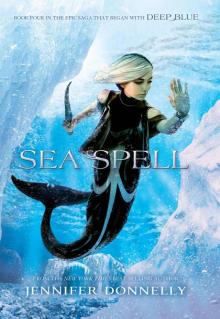 Waterfire Saga (4 Book Series)
Waterfire Saga (4 Book Series)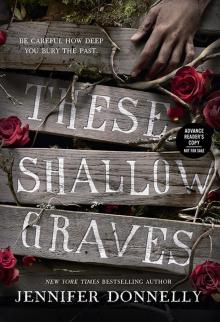 These Shallow Graves
These Shallow Graves Beauty and the Beast: Lost in a Book
Beauty and the Beast: Lost in a Book A Northern Light
A Northern Light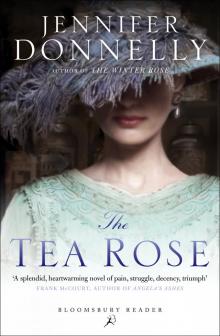 The Tea Rose
The Tea Rose Waterfire Saga, Book Three: Dark Tide: A Deep Blue Novel
Waterfire Saga, Book Three: Dark Tide: A Deep Blue Novel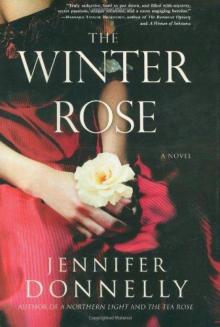 The Winter Rose
The Winter Rose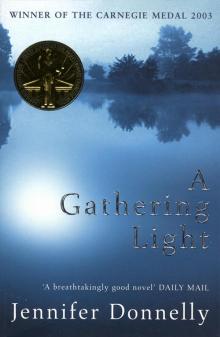 A Gathering Light
A Gathering Light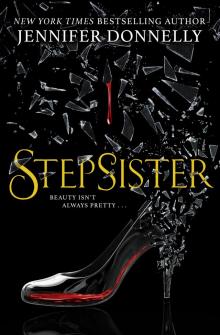 Stepsister
Stepsister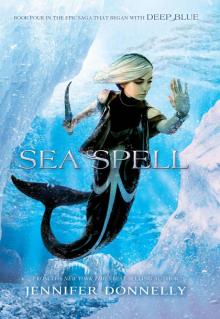 Waterfire Saga, Book Four: Sea Spell: Deep Blue Novel, A
Waterfire Saga, Book Four: Sea Spell: Deep Blue Novel, A Northern Light
Northern Light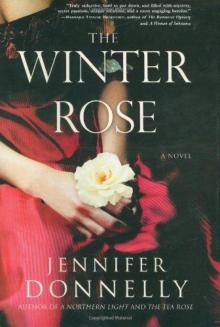 Winter Rose, The
Winter Rose, The